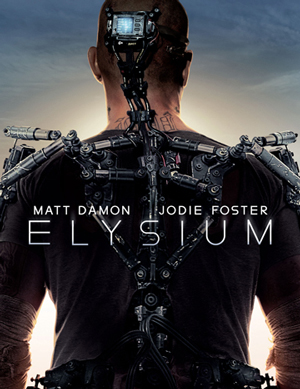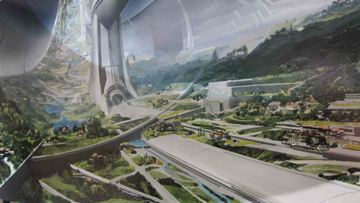 (Photo: © 2012 Columbia TriStar)
(Photo: © 2012 Columbia TriStar)
The year is 2154 and Earth lies in a state of ruin. Overpopulation and industrialization have devastated the environment, transforming much of the planet into a barren desert. Water is scarce, unemployment is high, and crime and disease are rampant. Governments have lost their power, and the world is now policed by the Civil Cooperation Bureau (CCB) and its army of humanoid robots.
This is the Earth of Elysium, a new film from Neill Blomkamp (District 9) that arrives in theatres this month. The story follows Max Da Costa (Matt Damon), an ordinary man who suddenly has the chance to do something extraordinary. But the clock is ticking and the CCB is after him. Can he save the world before his time runs out?
In the Balance
Max Da Costa is an unlikely hero. An orphan who grew up on the streets of Los Angeles, he's spent most of his life in and out of jail. But now he's trying to make an honest living at a factory for Armadyne, the company that makes the robots that keep the population of Earth in line. However, the work is dangerous and an accident there leaves him with five days to live. His only hope is to get to Elyisum.
Elysium is an idyllic man-made space station where the super-rich live in beautiful mansions, surrounded by lush green landscapes. There is no crime in Elysium, nor is there any sickness, thanks to the MedPod 3000, a diagnostic machine that can cure all known human diseases.
Getting to Elysium isn't easy. The security forces there, led by Secretary of Defence Delacourt (Jodie Foster), are determined to keep the undesirables and the unwanted—such as Max—out.
To get there, Max has to find a way of downloading the brainwaves of John Carlyle (William Fichtner), CEO of Armadyne. As CEO, Carlyle commutes to Earth every day so he can monitor the company's activities from behind the bulletproof glass of his Los Angeles headquarters.
The download is successful, but Max gets more information than he bargained for—information that could bring equality to these two worlds. What begins as a mission to save his own life becomes a mission to save the lives of millions on Earth as well.
But Secretary Delacourt will stop at nothing to get the information back from Max, and she unleashes one of the CCB's best agents—Kruger (Sharlto Copley)—to bring him down. An all-out battle follows, with the fate of Earth in the balance.
 Underworld and Overworld: The world of Elysium's time is split between the have-nots of a ruined Earth (see below) and those
Underworld and Overworld: The world of Elysium's time is split between the have-nots of a ruined Earth (see below) and those
privileged few who live above the clouds (Photo: © Columbia TriStar)
Heads in the Clouds
Though Elysium takes place in a futuristic world, the film feels grounded in reality thanks to Blomkamp's skilful world-building and meticulous attention to detail. The contrast between Earth and Elysium is near-perfect in its execution, and the action sequences punch with intensity.
But Elysium isn't all explosions and wonder-inducing technology. As fans of his previous film know, Blomkamp is concerned with major themes and ideas, and it's not hard to spot Elysium's overtones.
Set in the future, Elysium functions as a critique of the present and a cautionary tale of the future, showing what could happen if certain actions aren't taken. Most prominently, the film highlights the problem of poverty and explores the consequences of the increasing gap between rich and poor. These consequences include fewer opportunities and an overall decrease in quality of life for those who are not wealthy.
 (Photo: © Columbia TriStar)
(Photo: © Columbia TriStar)
In Elysium, poor living conditions and a lack of access to health care have resulted in a situation where life expectancy on the space station is three times that of the people down below. The film poignantly demonstrates that in a world where poverty, instability, exploitation and disease are the norm, dignity is no longer within reach.
The problem of widespread poverty is not a theoretical possibility that has no relevance to us today. In actuality, three million Canadians live in poverty, and 1.4 billion people live in extreme poverty worldwide. The entire world of Elysium's future is essentially the developing world of today. (In fact, the slums of future Earth were filmed in the slums of present-day Mexico.) And despite the publicity given to tragic events such as the recent collapse of a clothing factory in Bangladesh, which killed more than 1,100 workers, it can be easy for wealthier countries to forget about the suffering of those outside their borders. Like the people living on Elysium, we can become detached, above it all.
Words and Deeds
The cause of social justice is central to Elysium—as it is to the Christian faith. Throughout the Bible, we are called to defend the rights of the destitute (see Psalm 82:3) and care for those in need (see Luke 10:30-37; Deuteronomy 15:7; Acts 4:32-35).
Thousands of years before Elysium, Jesus came to Earth to demonstrate God's love for us—a love that is unconditional, self-sacrificing and never-ending. Jesus ministered to the very least of His own world—taking time to talk to strangers and outcasts, feeding thousands of hungry people and healing the sick. And in His death and Resurrection, He did what no other person could: He opened up a path for us to know God (see 1 Peter 3:18).
God's love is a free gift for every one of us, rich and poor. And social justice is about sharing the boundless love of God with others, not just through our words but with our actions (see 1 John 3:17-18). In Elysium, Max undertakes a dangerous mission to bring justice and equality to Earth. The question for us is, what can we do to help those in need today, to bring justice and equality to our own Earth? Any action—big or small—can make a difference.









Leave a Comment